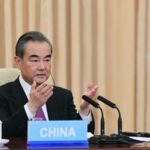Although Canberra has been making political noises about China, an Australian businesses community leader in China said complementarity and strong people-to-people ties underpin a mutually beneficial economic relationship between the two countries, and both governments should focus on the areas of strong collaboration and common interests.
Chinese and Australian cooperation represents one of the great economic success stories for delivering decades of “win-win” solutions for both nations and more broadly for the region, Nick Coyle, CEO and executive director of the China-Australia Chamber of Commerce (AustCham China), told the Global Times in a recent interview.
Complementarity and strong people-to-people ties have supported a mutually beneficial and meaningful economic relationship between China and Australia that have been built up over many years and “we expect those fundamentals to drive it into the future,” Coyle said.
“Businesses and governments at all levels will assess in time how they managed the challenges we are facing together. We’ll all ask ourselves what decision we have made, what worked well in hindsight and what didn’t. Also there are lessons to be learned for everyone that will better prepare us if anything like that happens again,” he said.
Coyle noted that it should be remembered that both China and Australia share common views with respect to globalization and multilateralism which form the foundation for sustainable China-Australian trade and economic relations, despite temporary differences.
“Bilateral relations can ebb and flow, and we urge both governments to focus on the areas of strong collaboration and areas of common interest,” he said, adding that where there are differences, and in any meaningful bilateral relationship there are always some differences of perspective, and these should be addressed in a constructive way.
Political trust between China and Australia was harmed due to a series of unfriendly moves against China such as its shunning Huawei’s 5G equipment, and Canberra’s backing for the US-desired investigation into the COVID-19 outbreak in China, which aims to smear China, said Liu Qing, director of the department for Asia-Pacific security and cooperation at the China Institute of International Studies.
The political impact will definitely extend to economic exchanges between the two countries. A direct reflection of this may be found in replacements for Australian farm imports, for instance, Chinese consumers may choose wine from European markets, Liu noted.
Australia should not discard its economic and trade ties with China that have been built over many years in order to fit some Australian politicians’ selfish interests, as such a short-sighted choice will harm Australian people’s interests, experts said.
Foreign Ministry Spokesperson Zhao Lijian said in a meeting on Wednesday that China has always advocated seeking common ground while reserving differences, as well as achieving win-win cooperation. “We hope Australia could meet China halfway and adopt more measures to improve bilateral relations and deepen mutual trust.”
“The key going forward will be managing our way through the current situation cooperatively for everyone,” Coyle said.
Despite the recent tension, Coyle said Australian companies remain optimistic about the Chinese market. In AustCham China’s most recent survey, two-thirds of members increased their investment in China. “As the Chinese economy reenergizes after the epidemic, looking at the long-term fundamentals for growth, our members remain optimistic about the opportunities in China.”
Chinese and Australian national flags are seen at an event in Sydney, Australia, September 8, 2019. Photo:Xinhua


